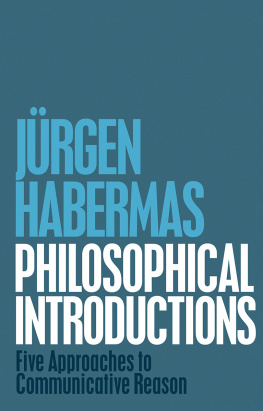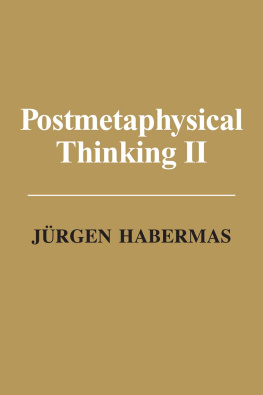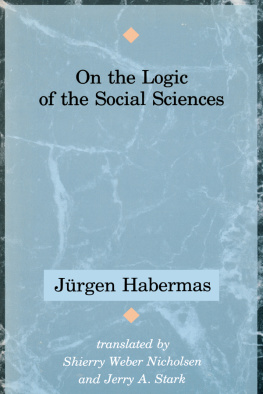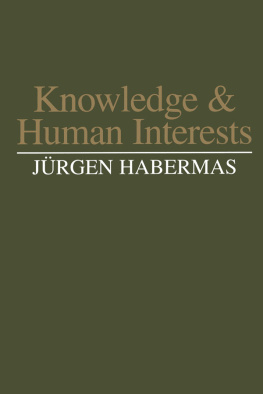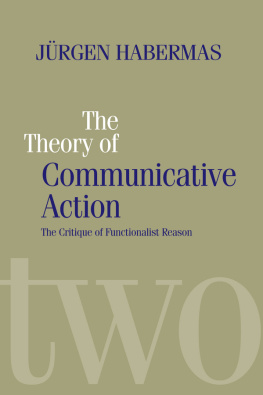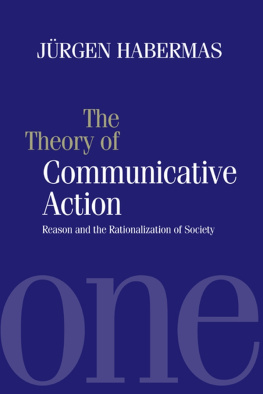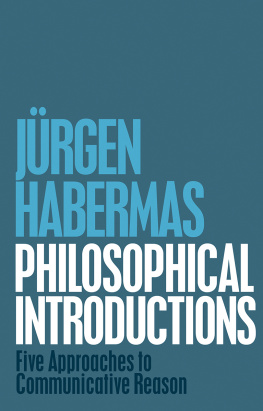Jrgen Habermas
Key Concepts
Key Concepts
Theodor Adorno: Key Concepts
Edited by Deborah Cook
Alain Badiou: Key Concepts
Edited by A. J. Bartlett and Justin Clemens
Pierre Bourdieu: Key Concepts
Edited by Michael Grenfell
Gilles Deleuze: Key Concepts
Edited by Charles J. Stivale
Michel Foucault: Key Concepts
Edited by Dianna Taylor
Jrgen Habermas: Key Concepts
Edited by Barbara Fultner
Martin Heidegger: Key Concepts
Edited by Bret W. Davis
Immanuel Kant: Key Concepts
Edited by Will Dudley and Kristina Engelhard
Merleau-Ponty: Key Concepts
Edited by Rosalyn Diprose and Jack Reynolds
Jacques Rancire: Key Concepts
Edited by Jean-Philippe Deranty
Wittgenstein: Key Concepts
Edited by Kelly Dean Jolley
First published 2011 by Acumen
Published 2014 by Routledge
2 Park Square, Milton Park, Abingdon, Oxon OX14 4RN
711 Third Avenue, New York, NY 10017, USA
Routledge is an imprint of the Taylor & Francis Group, an informa business
Editorial matter and selection, 2011 Barbara Fultner.
Individual contributions, the contributors.
This book is copyright under the Berne Convention.
No reproduction without permission.
All rights reserved. No part of this book may be reprinted or reproduced or utilised in any form or by any electronic, mechanical, or other means, now known or hereafter invented, including photocopying and recording, or in any information storage or retrieval system, without permission in writing from the publishers.
Notices
Practitioners and researchers must always rely on their own experience and knowledge in evaluating and using any information, methods, compounds, or experiments described herein. In using such information or methods they should be mindful of their own safety and the safety of others, including parties for whom they have a professional responsibility.
To the fullest extent of the law, neither the Publisher nor the authors, contributors, or editors, assume any liability for any injury and/or damage to persons or property as a matter of products liability, negligence or otherwise, or from any use or operation of any methods, products, instructions, or ideas contained in the material herein.
ISBN: 978-1-84465-236-5 (hardcover)
ISBN: 978-1-84465-237-2 (paperback)
British Library Cataloguing-in-Publication Data
A catalogue record for this book is available
from the British Library.
Designed and typeset in Classical Garamond and Myriad.
Contents
Barbara Fultner
Max Pensky
Melissa Yates
Barbara Fultner
Joseph Heath
Joel Anderson
William Rehg
Kevin Olson
Christopher Zurn
Keith Haysom
Ciaran Cronin
Eduardo Mendieta
Joel Anderson was educated at Princeton, Northwestern and Frankfurt Universities and taught at Washington University in St Louis before joining the Philosophy Department of Utrecht University. His research focuses on questions of autonomy, agency, normativity and recognition in philosophical anthropology, ethics and social theory. He edited Free Will as Part of Nature: Habermas and His Critics (special issue of Philo-sophical Explorations, March 2007) and Autonomy and the Challenges to Liberalism (with John Christman; 2005). His current book project is entitled Scaffolded Autonomy: The Construction, Impairment, and Enhancement of Human Agency.
Ciaran Cronin is a freelance translator and author and is a research associate at the Centre Marc Bloch in Berlin. He previously taught philosophy at the University of Illinois in Chicago and at Grinnell Col?lege in Iowa. He has published a number of papers on Habermas and political philosophy and is co-editor (with Pablo De Greiff) of Global Justice and Transnational Politics (2002).
Barbara Fultner is Associate Professor of Philosophy at Denison Univer-sity. She is the translator of, among other volumes, Jrgen Habermass Truth and Justification (2003). She works on topics in philosophy of language and social theory, with a special interest in intersubjectivity. Her articles have appeared in journals including Philosophical Stud-ies, The International Journal of Philosophical Studies and Continental Philosophy Review. In 20089, she was a Fellow at the University of Connecticut Humanities Institute.
Keith Haysom is a recent graduate of the New School for Social Research. He is currently teaching at the School for Political Studies, University of Ottawa and the Department of Political Science, Carleton University, in Ottawa, Canada. His research interests include critical theory, theories of intersubjectivity and language, social movements and global justice.
Joseph Heath is Professor of Philosophy at the University of Toronto. He is the author of Communicative Action and Rational Choice (2001), Following the Rules (2008) and various scholarly articles on the subject of critical theory, Habermas and practical rationality.
Eduardo Mendieta is Professor of Philosophy at the State University of New York, Stony Brook. He is the author of The Adventures of Tran-scendental Philosophy (2002) and Global Fragments: Globalizations, Latinamericanisms, and Critical Theory (2007). He recently co-edited (with Chad Kautzer) Pragmatism, Nation, and Race: Community in the Age of Empire (2009). He is presently at work on another book entitled Philosophys War: Logos, Polemos, Topos.
Kevin Olson is Associate Professor of Political Science at the University of California, Irvine. He is the author of Reflexive Democracy: Political Equality and the Welfare State (2006) and editor of Adding Insult to Injury: Nancy Fraser Debates Her Critics (2008). His work has also been published in the American Journal of Political Science, the Journal of Politics, Constellations and the Journal of Political Philosophy. In 20067 he was an Erasmus Mundus Scholar at Utrecht University, The Netherlands.
Max Pensky is Professor of Philosophy at Binghamton University, State University of New York. His recent works include The Ends of Solidarity: Discourse Theory in Ethics and Politics (2008). Current research projects include a study of the role of memory and forgetting in critical theory, and the status of amnesties for international crimes.
William Rehg is Professor of Philosophy at Saint Louis University. He is the author of Cogent Science in Context: The Science Wars, Argumenta-tion Theory, and Habermas (2009) and Insight and Solidarity: The Dis-course Ethics of Jrgen Habermas (1994); the translator of Habermass Between Facts and Norms (1996); and co-editor (with James Bohman) of Deliberative Democracy (1997) and Pluralism and the Pragmatic Turn (2001).
Melissa Yates is Assistant Professor of Philosophy at Rutgers University in Camden, New Jersey. She specializes in social and political philoso-phy, with particular interests in the works of Habermas and Rawls.
Christopher Zurn is Associate Professor of Philosophy at the University of Massachusetts Boston. He works on topics in constitutional democ-racy and in contemporary critical theory. He has authored Deliberative Democracy and the Institutions of Judicial Review (2007); co-edited (with Boudewijn de Bruin) New Waves in Political Philosophy



